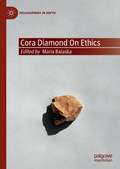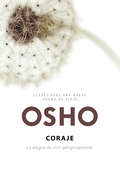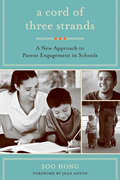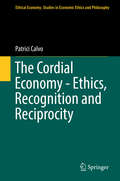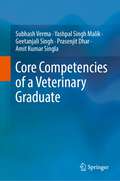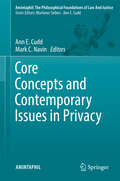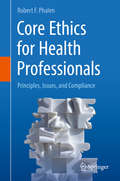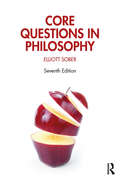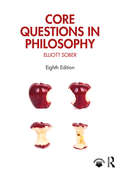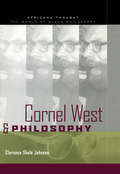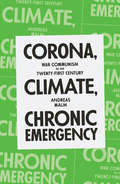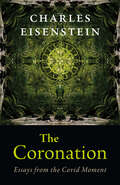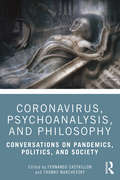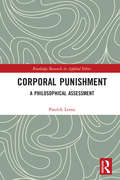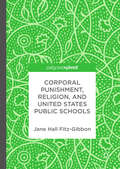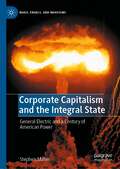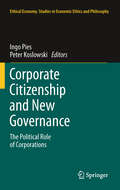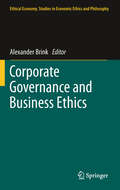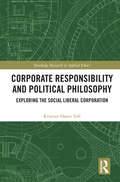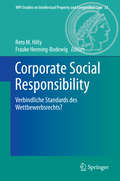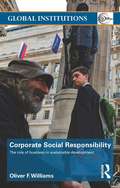- Table View
- List View
Cora Diamond on Ethics (Philosophers in Depth)
by Maria BalaskaThis collection offers an in-depth look at Cora Diamond’s distinctive approach to ethics and its philosophical significance. It comprises a new essay by Cora Diamond on the policing of concepts, followed by ten original chapters by world-class scholars covering conceptual loss, moral theory, the category of the human, the moral consideration of animals, and the meaning of narcissism. Including comparisons to the work of other contemporary moral philosophers such as Martha Nussbaum, Jeff McMahan, Rai Gaita, Eva Kittay, Christine Korsgaard, and Edward Harcourt, the volume also creates interdisciplinary links between Diamond’s work and other fields of study, including psychoanalysis and contemporary ethology. Showcasing the vital importance of Diamond’s contribution to philosophy, this volume is essential reading for scholars working in ethics, philosophy of language and literature.
Coraje: La alegría de vivir peligrosamente
by Osho OshoCoraje no es la ausencia de miedo, dice Osho. Por el contrario, es la total presencia del miedo y el valor para encararlo. Este libro proporciona una perspectiva general del terreno en el que se originan los miedos, cómo entenderlos, y como encontrar el coraje para encararlos. Osho propone que siempre que nos enfrentemos con la inseguridad y el cambio en nuestras vidas, debemos celebrarlo. Enlugar de aferrarnos a lo familiar y conocido, podemos aprender a disfrutar de estas situaciones como oportunidades para la aventuray para profundizar en nuestra comprensión de nosotros mismos y del mundo que nos rodea.El libro comienza con una exploración en profundidad del significado de la palabra coraje y de cómo se expresa en la vida cotidiana de cada persona. A diferencia de otros libros, que tratan de acciones heroicas de valentía en circunstancias excepcionales, el foco aquí está dirigido a desarrollar el coraje interno que nos permita llevar una vida satisfactoria en cualquier situación. Es el coraje necesario para cambiar, cuando el cambio es necesario, el coraje para defender nuestra propia verdad, incluso en contra de las opiniones de los demás, y el coraje para abrazar lo desconocido.
A Cord of Three Strands: A New Approach to Parent Engagement in Schools
by Soo HongHow can low-income, non-English-speaking parents become advocates, leaders, and role models in their children&’s schools? A Cord of Three Strands offers a close study of the Logan Square Neighborhood Association, a grassroots organization on the northwest side of Chicago, whose work on parent engagement has drawn national attention. The author identifies three elements—induction, integration, and investment—that together capture the dynamic and developmental nature of successful parent engagement. Writing with both optimism and urgency, author Soo Hong offers richly detailed portraits of parents&’ experiences and addresses the complex and sometime conflicting relationships among school, family, and community.
The Cordial Economy - Ethics, Recognition and Reciprocity (Ethical Economy #55)
by Patrici CalvoThis book proposes, from a civil perspective —such as that developed by Stefano Zamagni— and a cordial perspective —such as that developed by Adela Cortina—, orientations to design an economy in tune with what the historical moment demands. Among other things, this comes from encouraging institutions, organisations and companies to include in their designs aspects as important for carrying out their activities as cordial reciprocity, mutual recognition of the communicative and affective capacities of the linked or linkable parties, public commitment and the active participation of civil society.The book first shows the conceptualisation of the process of self-interest as operating for one’s own benefit and its inclusion in the orthodox economic model. In Chapter 2 it then displays some of the logical/formal and experimental limits of the axiomatic economics model to discover the possibility of building bridges between theoretical modelling and factual validation. Chapter 3 demonstrates the fragility of a rationality model based on the paradigmatic figure of homo oeconomicus. Chapter 4 reflects on the critical process that has identified reciprocity as a determining factor for human cooperation, turning this behaviour into a paradox in which the lack of a reasonable explanation from the selfish perspective becomes inconsistent in the predominant economic theory. Chapter 5 is from a moral point of view it describes and criticises the different approaches to reciprocity observed by sociologists, biologists, psychologists and economists. Chapter 6 analyses three mutual recognition proposals as possible foundations for human cooperation, highlighting one of them –cordial recognition, developed by Cortina– because it is more closely related to studies of reciprocity, particularly the most recent contributions from the neurosciences. Chapter 7 proposes cordial reciprocity as a horizon of meaning for the various approaches to reciprocity observed. Chapter 8 explores the possible emergence and development of cordial goods, a type of relational and communicative good that enables joint actions to take place in different contexts of human activity. Chapter 9 analyses the application and implementation of cordial reciprocity at the macro, meso and micro levels of the economy. And finally, it proposes guidelines for designing a monitoring and compliance system which, based on the communication, storage and processing of big data and the committed participation of stakeholders, offers businesses the possibility of inspecting their underlying dimensions of morality, emotions and responsibility.
Core Competencies of a Veterinary Graduate
by Subhash Verma Yashpal Singh Malik Geetanjali Singh Prasenjit Dhar Amit Kumar SinglaThis book is an essential guide for veterinarians, veterinary faculty and policymakers for understanding the core competencies of a fresh veterinarian. The book briefly covers competencies in preclinical, paraclinical, and clinical subjects including anatomy, physiology, biochemistry, veterinary jurisprudence, animal management & welfare including nutrition and breeding, infectious and non-infectious diseases, disease epidemiology, diagnosis, and treatment, prevention, control and zoonoses, surgical and other clinical interventions. The book further includes other competencies, including biologicals, anti-mortem, and post-mortem inspection, certifications, applied one health aspects, review and analysis of scientific evidence, international trade and regulations, and organization of veterinary services. It also highlights the importance of effective communication, interpersonal skills, record keeping and management of a small veterinary hospital, health informatics, etc. The book breakdowns the must-have competencies of a global veterinarian into different topics and subtopics for easy comprehension and further learning. It enables the professional standard-setting & regulatory bodies and academicians in improved curricula designing and implementation and more importantly tries to bring uniformity in day one veterinary graduates’ competencies globally, enhancing the movement and employability of veterinarians across the world.
Core Concepts and Contemporary Issues in Privacy (Amintaphil: The Philosophical Foundations Of Law And Justice Ser. #8)
by Ann E. Cudd Mark C. NavinThis book offers a comprehensive investigation of privacy in the modern world. It collects 16 papers that look at this essential topic from many facets, from the personal to the technological, from the philosophical to the legal. The contributors examine such issues as the value of privacy protection, the violation of spreading personal falsehoods, the digital rights of children, an individual's right to be forgotten from internet search engines, and more.The organization of the volume helps provide a nuanced understanding of this often controversial topic. Coverage starts with key concepts before moving on to explore personal information privacy and the impact of new technologies. Next, the papers consider privacy in different contexts. These include work, sex, family, crime, and religion. This structure enables greater engagement with the difficult questions about privacy. Readers will gain deep insight into the core concepts of privacy as well as its application to everyday life. This interdisciplinary volume brings together an international team of scholars. They provide a broad combination of expertise in law, philosophy, and political science. Overall, this thought-provoking examination will appeal to interested readers in both academia and practice.
Core Ethics for Health Professionals: Principles, Issues, and Compliance
by Robert F. PhalenA timely overview of ethics, emphasizing applications to biomedical researchers, health providers, and administrators There are no simple rules to guide ethical conduct in daily practice, health professionals must have a basic understanding of several topics including ethical theories; ethical scandals; laws, regulations, and institutional policies; and public perceptions. This book can be used for self-study, for classroom instruction, and as a refresher and update by practicing health professionals. The chapters have learning objectives, focused content, a summary of important points, a quiz, and a list of key references. Although the book is arranged in a logical order, each chapter may be studied independently.
Core Questions in Philosophy: A Text with Readings (Mythinkinglab Ser.)
by Elliott SoberWriting in an engaging lecture-style format, Elliott Sober shows students how philosophy is best used to evaluate many different kinds of arguments and to construct sound theories. Well-known historical texts are discussed, not as a means to honor the dead or merely to discuss what various philosophers have thought, but to engage with, criticize, and even improve ideas from the past. In addition—because philosophy cannot function apart from its engagement with the wider society—traditional and contemporary philosophical problems are brought into dialogue with the physical, biological, and social sciences. Text boxes highlight key concepts, and review questions, discussion questions, and a glossary of terms are also included. Core Questions in Philosophy has served as a premier introductory textbook for more than two decades, with updates to each new edition. New improvements to this seventh edition include a lower price and a new Routledge companion website that includes: Updated supplementary readings, with the inclusion of more work from female philosophers New videos and podcasts, organized by their relevance to each chapter in the book. Visit the companion website at: www.routledge.com/cw/sober.
Core Questions in Philosophy
by Elliott SoberWrittten in an engaging lecture-style format, this 8th edition of Core Questions in Philosophy shows students how philosophy is best used to evaluate many different kinds of arguments and to construct sound theories. Well-known historical texts are discussed, not as a means to honor the dead or merely to describe what various philosophers have thought but to engage with, criticize, and even improve ideas from the past. In addition—because philosophy cannot function apart from its engagement with the wider society—traditional and contemporary philosophical problems are brought into dialogue with the physical, biological, and social sciences. Text boxes highlight key concepts, and review questions, discussion questions, and a glossary of terms are also included. Core Questions in Philosophy has served as a premier introductory textbook for three decades, with updates to each new edition. Key updates to this 8th edition include: A new chapter, "Probability and Bayes' Theorem" A new explanation of the concept of "soundness," as a useful tool in assessing arguments A clearer explanation, in the chapter on evolution, of the crucial biological idea that the similarities of different species provide evidence of their common ancestry A new discussion of evolutionary altruism in the chapter on psychological egoism A presentation of two interesting arguments from historically important Islamic and Confusian philosophers Improved clarity and updated material from philosophy and empirical research, throughout Revisions to the online list of recommended resources include: Additional recommendations of supplementary readings, with the inclusion of more work from female philosophers New recommended videos and podcasts, all organized by their relevance to each chapter in the book
Corinthian Wisdom, Stoic Philosophy, and the Ancient Economy
by Timothy A. BrookinsThis work re-examines the divisive wisdom that Paul addresses in 1 Corinthians. Challenging the recent consensus that the Corinthians' wisdom was rooted primarily in the Greco-Roman rhetorical tradition, Timothy A. Brookins offers a revisionary thesis centered on discourse similarities between the perspective of the Corinthian "wise" and the Stoic system of thought. Brookins argues that several members of the church, after hearing Paul's initial gospel message, construed that message in terms of Stoic philosophy and began promoting a kind of "Stoic-Christian" perspective that helped to precipitate divisions in the church. Being apprised of their views, Paul then exploited the "Stoic" discourse of his opponents in order to sustain common discursive ground. In addition to providing a fresh synthesis of the data in 1 Corinthians, Brookins brings in cutting-edge research on the ancient economy as he explores questions related to philosophical education and social status within the church community.
Cornel West and Philosophy (Africana Thought)
by Clarence JohnsonFirst published in 2003. Routledge is an imprint of Taylor & Francis, an informa company.
Corona, Climate, Chronic Emergency: War Communism in the Twenty-First Century
by Andreas MalmWhat does the COVID 19 tell us about the climate breakdown, and what should we do about it?The economic and social impact of the coronavirus pandemic has been unprecedented. Governments have spoken of being at war and find themselves forced to seek new powers in order to maintain social order and prevent the spread of the virus. This is often exercised with the notion that we will return to normal as soon as we can. What if that is not possible? Secondly, if the state can mobilize itself in the face of an invisible foe like this pandemic, it should also be able to confront visible dangers such as climate destruction with equal force. In Corona, Climate, Chronic Emergency, leading environmental thinker, Andreas Malm demands that this war-footing state should be applied on a permanent basis to the ongoing climate front line. He offers proposals on how the climate movement should use this present emergency to make that case. There can be no excuse for inaction any longer.
Corona-Pandemie – die Folgen für die Arbeits- und die Alltagswelt (essentials)
by Irene RaehlmannDas essential thematisiert die Folgen der Corona-Pandemie für die Arbeits- und Alltagswelt. Im Kontext des aktuellen Leitbilds der Gestaltung von Arbeitsorganisationen werden folgende Bereiche der Lebenswelt behandelt: Das Homeoffice und das Homelearning sowie der Wandel der Öffentlichkeit. Das Fazit widmet sich den Folgen für das Wirtschaftssystem, den Problemen wissenschaftlicher Politikberatung, der Digitalisierung von Unterricht und Lehre sowie der Integration der Menschen, aber auch der Gesellschaft insgesamt.
The Coronation: Essays from the Covid Moment
by null Charles Eisenstein"There are moments in our history in which the art of the written word captures the extraordinary beauty of the human condition as it hangs suspended in tenuous polarity at a tipping point of evolution. The Coronation is one of these moments."—Zach Bush, MDControversy and despair, hope and isolation, courage and division, withdrawal and reunion. How can we find meaning as we emerge from the troubled time of Covid?In The Coronation, social philosopher Charles Eisenstein presents key building blocks of post-Covid sense-making. These unforgettable essays narrate the disintegration of an old normal, and old reality, even, Eisenstein says, an old mythology. Controversial when they first appeared, these essays—with new introductions to each by the author—ring with relevancy as the charge dissipates from previously hot-button issues. Now, as we survey the post-Covid landscape, we have the opportunity to build something more sound, more whole, and more sane. Individually, these essays have been read, shared, and discussed by tens of thousands of people around the globe, but are collected together and bound here for the first time.The Coronation brings new clarity to a vital question whose time has come: What world shall we choose now?"An intelligent, compassionate, and uncompromising book . . . without falling into either partisan hysteria or a shameless defense of power. This is a necessary and brave read."—Paul Kingsnorth, author of The Wake2023 Nautilus Book Award Gold Medal Winner: Rising To The Moment-Focused Topic: COVID Pandemic
Coronavirus, Psychoanalysis, and Philosophy: Conversations on Pandemics, Politics and Society
by Fernando Castrillón Thomas MarchevskyOriginally published in the European Journal of Psychoanalysis (EJP), the essays in this volume are a set of responses to the coronavirus crisis by distinguished philosophers and psychoanalysts from around the globe. The coronavirus irrupted making swift and deep cuts in the fabric of our existence: the risks of contagion and indefinite periods of isolation have radically altered the functioning of society. Pandemics do not wait for comprehension in order to proliferate. Confusion, sickness, and death punctuate the failure of governments worldwide to respond. This collection of writings examines the effects of the pandemic and the conditions that make possible such a global crisis. The writers provoke us to consider how capitalism, governmental power, and biopolitics mold the contours of life and death. The contributors in this collection ignite urgent political dialogue, address emergent transformations in the social field and offer perspectives on shifts in subjectivity and psychoanalytic practice. Beyond providing reflections on the impact of the coronavirus, the authors point to determinants of how the crisis will unfold and what may be on the horizon. This book will be invaluable to psychoanalysts, psychotherapists, philosophers, and to all those interested in the implications of the virus for psychoanalytic practice and theory, and the social, cultural and political spheres of our world.
Corporal Punishment: A Philosophical Assessment (Routledge Research in Applied Ethics)
by Patrick LentaThe aim of this book is to assess the moral permissibility of corporal punishment and to enquire into whether or not it ought to be legally prohibited. Against the widespread view that corporal punishment is morally legitimate and should be legally permitted provided it falls short of abuse, Patrick Lenta argues that all corporal punishment, even parental spanking, is morally impermissible and ought to be legally proscribed. The advantages claimed for corporal punishment over alternative disciplinary techniques, he contends, are slight or speculative and are far outweighed by its disadvantages. He presents, in addition, a rights-based case against corporal punishment, arguing that children possess certain fundamental rights that all corporal punishment of them violates, namely the right to security of the person and the right not to be subjected to degrading punishment. Lenta’s approach is unique in that it engages with empirical literature in the social sciences in order to fully examine the emotional and psychological effects of corporal punishment on children. Corporal Punishment: A Philosophical Assessment is a philosophically rigorous and engaging treatment of a hitherto neglected topic in applied ethics and social philosophy.
Corporal Punishment, Religion, and United States Public Schools
by Jane Hall Fitz-GibbonThis book examines corporal punishment in United States public schools. The practice--which is still legal in nineteen states--affects approximately a quarter million children each year. Justification for the use of physical punishment is often based on religious texts. Rather than simply disregarding the importance of religious commitment, this volume presents an alternative faith-based response. The book suggests the "hermeneutical triad," of sacred text, tradition, and reason as an acceptable approach for those seeking to be faithful to religious text and tradition.
Corporate Capitalism and the Integral State: General Electric and a Century of American Power (Marx, Engels, and Marxisms)
by Stephen MaherThis book advances an original conception of the relationship between state and corporate power in the United States. Using what he terms an Institutional Marxist framework, Maher argues that, far from passively responding to interest group pressures, the state has been a key agent in politically mobilizing business, and has played an active role in the organization of lobbying groups. Such business associations do not merely express the pre-existing interests of their corporate members, but are also mechanisms through which the state organizes the political power of the capitalist class. They form part of what the author refers to as an integral state—a wider network of state power which traverses and interpenetrates the state bureaucracy, the legislature, the industrial policy apparatus, and corporate governance. Based on extensive archival research, this book tracks the role of the General Electric Company as a pillar of the integral state in the United States from the finance capital period (1880 to 1930), through the managerial period (1930-1979), to the restructuring leading up to the age of neoliberalism (1979-present).
Corporate Citizenship and New Governance: The Political Role of Corporations (Ethical Economy #40)
by Peter Koslowski Ingo PiesThis volume unites the perspective of business ethics with approaches from strategic management, economics, law, political science, and with philosophical reflections on the theory of Corporate Citizenship and New Governance. In view of the internationalization of the (global) economy and the free movement of capital, new instruments of political coordination are needed. These societal changes trigger the two closely intertwined challenges examined in this book. The first challenge relates to the role and the self-conceptualization of business firms as corporate citizens within society. Companies are increasingly expected to assume the social responsibility of helping to shape the rule-framework of globalization. The second challenge refers to the form of the engagement in local, national and international processes of governance. To more credibly and effectively tackle these challenges, corporate actors are ever more participating in rule-setting processes together with civil society organizations and the government.
Corporate Governance and Business Ethics (Ethical Economy #39)
by Alexander BrinkThis volume explores corporate governance from three perspectives: a traditional economic, a philosophical, and an integrated business ethics perspective. Corporate governance has enjoyed a long tradition in the English-speaking world of management sciences. Following its traditional understanding it is defined as leadership and control of a firm with the aim of securing the long-term survival and viability of that firm. But recent business scandals and financial crises continue to provide ample cause for concern and have all fuelled interest in the ethical aspects. As a result, corporate governance has been criticized by many social groups. Economic sciences have failed to provide a clear definition of the corporate governance concept. Complexity increases if we embed the economic approach of corporate governance in a philosophical context. This book seeks to define the concept by examining its economic, philosophical and business ethics foundations.
Corporate Responsibility and Political Philosophy: Exploring the Social Liberal Corporation (Routledge Research in Applied Ethics)
by Kristian Høyer ToftThis book argues for the inclusion of the corporation as an integral element of political philosophy. It begins with a historical evaluation of the corporation as a constituent of political society. It shows how Adam Smith, Hegel, and Marx conceived the role of the corporation in relation to the state, the market and civil society, before moving on to the rejection of the corporation as a genuine moral and political agent by Rawls and Habermas. The next chapter of the book presents the corporation as a collective that possesses political and moral agency. The author outlines four distinct political philosophies of corporate responsibility: the Aristotelian conservative-virtue ethical conception; the market liberal theory; the social liberal theory of corporate citizenship and political CSR; and Marxist-inspired critical theories. It is argued that the social liberal theory provides a better justification compared to its rivals. The third and final group of chapters applies the social liberal conception – called the social liberal corporation – to important contemporary issues, including human rights in global supply chains, financial and digital firms, sustainability and climate change. Corporate Responsibility and Political Philosophy will appeal to political philosophers, political theorists, and applied ethicists, as well as scholars in other disciplines working on issues related to business ethics, organizational ethics, sustainability and corporate social responsibility. As it provides a comprehensive introduction to corporate responsibility it is also relevant to sustainability professionals who seek an overview of the theoretical debate on corporate responsibility.
Corporate Romanticism: Liberalism, Justice, and the Novel (Lit Z)
by Daniel M. StoutCorporate Romanticism offers an alternative history of the connections between modernity, individualism, and the novel. In early nineteenth-century England, two developments—the rise of corporate persons and the expanded scale of industrial action—undermined the basic assumption underpinning both liberalism and the law: that individual human persons can be meaningfully correlated with specific actions and particular effects. Reading works by Godwin, Austen, Hogg, Mary Shelley, and Dickens alongside a wide-ranging set of debates in nineteenth-century law and Romantic politics and aesthetics, Daniel Stout argues that the novel, a literary form long understood as a reflection of individualism’s ideological ascent, in fact registered the fragile fictionality of accountable individuals in a period defined by corporate actors and expansively entangled fields of action.Examining how liberalism, the law, and the novel all wrestled with the moral implications of a highly collectivized and densely packed modernity, Corporate Romanticism reconfigures our sense of the nineteenth century and its novels, arguing that we see in them not simply the apotheosis of laissez-fair individualism but the first chapter of a crucial and distinctly modern problem about how to fit the individualist and humanist terms of justice onto a world in which the most consequential agents are no longer persons.
Corporate Social Entrepreneurship
by Christine A. HemingwayBusiness ethics teaching appears to have had little impact, particularly in the light of continued malpractice and misdemeanour in the form of financial scandals, environmental disasters and adverse consequences for communities. This timely book directly addresses a central question: is it that the existence of an ethical or an unethical climate influences behaviour, or, does the presence or absence of a moral character and personal values have the greatest influence on behaviour at work? Drawing on an empirically derived study and over thirty years of experience in both the public and private sectors, Hemingway proposes four modes of individual moral commitment to corporate social responsibility (CSR) and sustainability: the Active Corporate Social Entrepreneur, the Concealed Corporate Social Entrepreneur, the Conformist and the Disassociated. The discovery of the corporate social entrepreneur offers students and scholars a critical, alternative and optimistic perspective for the future of ethical business.
Corporate Social Responsibility: Verbindliche Standards des Wettbewerbsrechts? (MPI Studies on Intellectual Property and Competition Law #21)
by Reto M. Hilty Frauke Henning-BodewigIm Zuge der Finanz- und Wirtschaftskrise wird verstärkt diskutiert, welcher Mechanismen es bedarf, um die Interessen aller Marktteilnehmer im Wirtschaftsleben zu wahren. Große Bedeutung gewonnen hat dabei der Aspekt der ,,business ethics". So richten immer mehr Unternehmen sog. Compliance-Abteilungen ein, die die Einhaltung von unternehmensinternen Grundsätzen wie namentlich die der ,,Corporate Social Responsibility" (CSR) zur Aufgabe haben. Kaum untersucht ist bislang jedoch die rechtliche Verbindlichkeit solcher CSR-Standards, obgleich sie zunehmend von Unternehmen auf ihrer Website verkündet oder auf anderem Wege zu Public Relations- und Marketingzwecken - bis hin zur Werbung - eingesetzt werden. Sind CRS damit nur wohlklingende Absichtserklärungen, oder handelt es sich um rechtlich verbindliche Standards - und wenn ja, unter welchen Voraussetzungen entsteht ein Rechtsanspruch gegen Unternehmungen, wenn diese die sich selbst gegebenen Standards nicht einhalten? Anders gefragt: Gibt es ein ,,corporate right to lie", oder setzt das (deutsche, europäische, internationale) Recht Grenzen? Im Fokus steht hierbei das Recht zur Bekämpfung unlauteren Wettbewerbs, im deutschen Sprachgebrauch kurz auch Lauterkeitsrecht genannt, das in allen entwickelten Wirtschaftsnationen - wenn auch mit unterschiedlichem Ansatz - Markthandlungen unter dem Gesichtspunkt der ,,Fairness" überprüft. Die Autoren der Beiträge dieses Buches sind ausgewiesene Fachleute des Europa-, Wirtschafts- und Wettbewerbsrechts. Sie diskutieren auf der Grundlage rechtstatsächlicher Erkenntnisse alle mit der wettbewerbsrechtlichen Beurteilung von CSR zusammenhängenden Fragen, insbesondere unter Berücksichtigung der Rolle, die CSR für Unternehmen, Abnehmer und die Gesamtwirtschaft spielt. Auch die Vorstellungen anderer Rechtsordnungen und Kulturkreise sind einbezogen. Gefragt wird letztlich, ob es ein Unternehmerleitbild gibt, das die Beachtung ethischer Standards einschließt und das über das Lauterkeitsrecht auch rechtliche Verbindlichkeit erlangt. Mit Keynote von Gesine Schwan.
Corporate Social Responsibility: The Role of Business in Sustainable Development (Global Institutions)
by Oliver F. WilliamsOver the last 30 years, corporate social responsibility (CSR) has become a household term, reflecting a combination of factors that we have come to associate with that most catch-all of terms "globalization," including the widespread popular concern with such social issues as the environment and international human rights. Corporate Social Responsibility examines the history of the idea of business ethics (which goes back at least to ancient Mesopotamia) before exploring the state of CSR today. This book argues that a wide-ranging understanding of the purpose of business is necessary to create value for a community of stakeholders which in turn can generate a sustainable future. The book suggests that corporations still have a long way to go, but remains optimistic. The book’s sanguine interpretation of the current state of corporate affairs and a recommended way forward, results not only from the authors analysis, but also his direct experience. This book presents the case that we are in the midst of a major paradigm shift in our understanding of the purpose of business and that this new understanding holds much promise for business being a significant force for a more just and peaceful world. This work provides a concise overview of CSR and an important examination of the present and future work of the UN Global Compact and will be of interest to students of international organizations, international business and corporate social responsibility.
